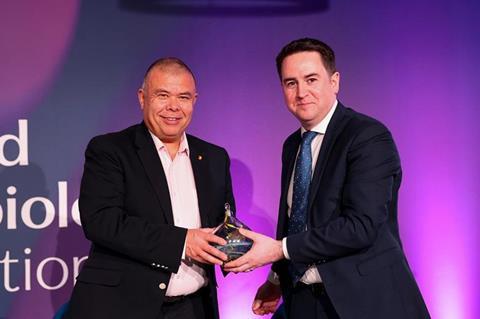One of the highlights of the annual Applied Microbiology International Awards 2022 was the presentation of an Honorary Fellowship by Applied Microbiology International to Professor SIr Jonathan Van-Tam.
Pro-Vice-Chancellor for Faculty of Medicine and Health Sciences at the University of Nottingham, he was Deputy Chief Medical Officer from October 2017 to March 2022, playing important roles in a number of different incidents.
These included domestic outbreaks of MERS and monkeypox, as well as the 2017 to 2018 influenza season, but he hit the headlines for his role in the response to the novichok attacks and the COVID-19 pandemic when he worked on the Vaccine Taskforce and supported the development of treatments.

AMI President Brendan Gilmore presented Jonathan Van-Tam with an Honorary Fellowship during a glittering ceremony at London’s Science Museum on 29 November 2022.
Thanking AMI for the honour, Jonathan Van-Tam said:
Distinguished guests, ladies and gentlemen, thank you so much indeed for the invitation this evening and for this huge honour which, as a public health physician and an epidemiologist primarily, you don’t expect from a group of primarily microbiologists. So thank you very much. It means a great deal to me.
I know that a lot of the younger membership were kind of instrumental in kind of making the vote and so forth. And I thank you for that.
And one of the things that’s happened in this pandemic, which has been, I think, the worst in respiratory terms since 1918.
One of the things that has happened is that we got to a certain point and then the pandemic was over. The political narrative was that this pandemic was over, even though we know this virus will persist in humankind for a very long time, perhaps forever.
One of the things that is now emerging is that this is a kind of once in a lifetime event. My personal view is that it may be once in a political lifetime, but for the younger generation and the younger scientistsin the audience, this isn’t going to be once in your lifetime, I’m afraid. It’s quite likely that there will be more.
And as the agency of humans gets closer and closer to the agency of animals and the animal kingdom, I think the likelihood of humans being exposed to new organisms that we don’t yet know about just gets greater and greater.
So I’d love to reassure you that you’ve worked through this once in a lifetime event, but I think in terms of what’s left of your career, compared to what’s left of my career, the chances of this being a once in a lifetime event for you are actually very small.
Now, we have got through this and we’ve got through this, I think, as a society remarkably well. And although there’s nothing fortunate about pandemics, one of the things that I think was fortunate was the fact that it happened in 2020 and not in 2015.
If it had happened in just 2015, I don’t think the messenger RNA technology would have been ready to deliver at scale in the way that it has done now for us. And ,it is largely the reason why we meet together this evening mingling, talking, no two metre distances in relative safety.
And I think this messenger RNA technology is likely to open up, first of all, buy-and-try pathogen vaccines for respiratory viruses in the future - I’m obviously thinking of flu and RSV, and I think beyond that, the likelihood of there being cancer vaccines arising from the messenger RNA technology is quite high too. So it really potentially could be a very great game changer.
But behind those big headlines, the kind of big science and behind the political leadership, behind the kind of science leaders that have been forced into the public limelight, are people like yourselves who did the hard yards of all that testing and processing of specimens during the darker days of the pandemic, when we didn’t have vaccines and when the only thing that we could use to give as information for action to prevent the spread of the virus was actually testing.
And I think we very quickly and I think the public will very quickly, unfortunately, forget the kind of reliance we all placed on what you did unseen in the laboratories behind the scenes, and that should not be forgotten.
So I think I want to end there, just to say thank you once again for this tremendous honour and hope you’ve had a wonderful evening.







No comments yet